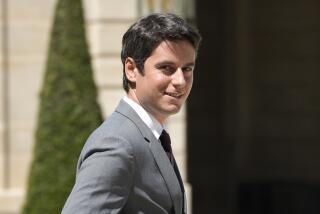WORLD PERSPECTIVE / EUROPE : Popularity of French Premier Defies the Odds : Edouard Balladur has weathered enough crises to sink many a leader. But his ratings just keep rising.
- Share via
PARIS — Take your pick of metaphors. Maybe he is, as one analyst suggests, the inoxydable , or stainless steel, prime minister. Or perhaps he is, as another sees him, more of a buvard , an industrial-strength sponge that “absorbs everything.”
Call him what they will, French Prime Minister Edouard Balladur has in just 10 months on the job suffered enough political crises to sink many a leader. And he has not just survived, but flourished, becoming the runaway favorite to succeed President Francois Mitterrand in 1995.
“Nobody predicted Balladur would ever be this popular,” said Alain Duhamel, a French political analyst. “But he corresponds well to the political equilibrium in France these days. The French wanted change. They wanted a certain respectability. And they were fed up with politicians offering ready-made solutions that didn’t work.”
Balladur, 64, has had one bona fide success in the eyes of the electorate: He took a tough line with American negotiators in talks leading to the General Agreement on Tariffs and Trade, exacting concessions on agriculture and entertainment that were hailed here as a great victory for France.
But there has been no shortage of threats to his popularity, including the continuing 12% jobless rate, recession, strikes and diplomatic miscues.
Balladur’s plan to cut jobs at the ailing state-run airline, Air France, touched off an ugly strike last fall, forcing him to capitulate to strikers. Then, to general dismay, he sent two alleged Iranian terrorists, wanted by Switzerland, back to safe harbor in Iran--and refused to explain why, except to cite vague concerns of “national security.”
A few weeks ago, Balladur and three government ministers went to Saudi Arabia promising to sign big arms deals for French companies, only to leave empty-handed and embarrassed.
And, when he tried to sneak in a new law increasing private school funding a few weeks ago, a legislative court annulled the law and 600,000 people still took to the streets of Paris in protest.
So how is Balladur doing after all that? Just fine, the French say.
Recent opinion polls give him a 60% positive rating, a tally that has been increasing steadily. Among all the potential candidates for French presidential elections in 1995, Balladur has the support of about 60% of the electorate, the polls indicate.
At the same time, nearly two-thirds of the French believe they are being poorly governed.
*
Even Balladur admits to being baffled by the polls.
“It is paradoxical that the French have evidently still a good opinion of me, and yet apparently believe they are badly governed,” he told the Financial Times of London, which anointed him its “Man of the Year.”
Oddly enough, Balladur became the prime minister last March because he didn’t have presidential ambitions. He was part of the conservative coalition that won 484 of 577 seats in the National Assembly last year.
But the political pillars of the right, fellow Gaullist Jacques Chirac and the centrist former President Valery Giscard d’Estaing, didn’t want the job. They feared their own presidential aspirations would be bruised in a two-year “cohabitation” with Mitterrand, the Socialist president.
Under the French system, the president is elected for a seven-year term and enjoys wide powers as chief of state. But the prime minister is responsible for forming a government and directing domestic policy. On occasion, that system has resulted in battles between a president and prime minister from opposite ends of the political spectrum.
But this cohabitation has gone well, further polishing Balladur’s reputation as a courteous, honest man who stands above the political fray.
Will his popularity last? Much will depend on his ability to treat the ailing economy and carry out his ambitious plans to privatize two dozen state-owned industries. But few analysts are willing to bet against the man in the Savile Row suits who already has defied the odds.
“I think it’s going to last,” Duhamel said. “But it is going to be tested. The big question is whether he will be able to give the kind of dynamic economic leadership that the French are waiting for.”
More to Read
Sign up for Essential California
The most important California stories and recommendations in your inbox every morning.
You may occasionally receive promotional content from the Los Angeles Times.










